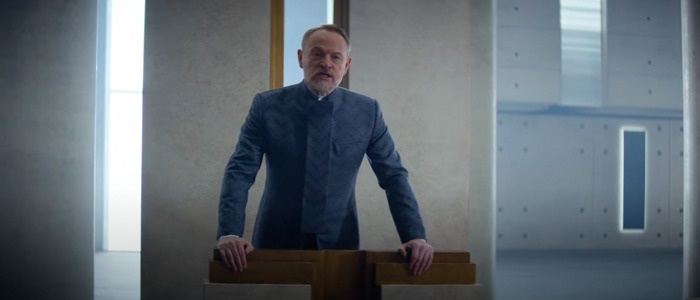'Foundation' Trailer: David S. Goyer Brings Isaac Asimov's Sci-Fi Series To Apple TV+
Isaac Asimov's influential Foundation trilogy is now a series on Apple TV+, and a new trailer for the series looks pretty darn slick. Created by David S. Goyer and Josh Friedman, the series promises "a thrilling and emotional journey following a band of exiles who discover that the only way to save the Galactic Empire from destruction is to defy it." I'm a big fan of thrilling and emotional journeys, so this should be good.
Foundation Trailer
Here's the part of the story where I reveal that I've never read any Foundation books. I'm very sorry. But I know the books' reputation, and I know what a huge deal Asimov was to the world of popular science and sci-fi. Despite Asimov's legacy, there aren't a whole slew of adaptations based on his work. The first one that springs to mind is the Will Smith movie I, Robot, which bears almost zero resemblance to its source material. Perhaps Foundation will be a better reflection of Asimov's writing.
In Foundation, "When revolutionary Dr. Hari Seldon predicts the impending fall of the Empire, he and a band of loyal followers venture to the far reaches of the galaxy to establish The Foundation in an attempt to rebuild and preserve the future of civilization. Enraged by Hari's claims, the ruling Cleons — a long line of emperor clones — fear their unrivaled reign may be weakening as they're forced to reckon with the potential reality of losing their powerful legacy forever."
The cast includes Jared Harris, Lee Pace, Lou Llobell, Leah Harvey, Laura Birn, Terrence Mann, Cassian Bilton, and Alfred Enoch. The 10-episode first season comes from showrunner and executive producer David S. Goyer, with Robyn Asimov, Josh Friedman, Cameron Welsh, David Ellison, Dana Goldberg and Bill Bost also serving as executive producers. Look for Foundation on Apple TV+ on September 24, 2021.
Transcending Space and Time
Part of the promo material for Foundation proclaims that the show is a "monumental adaptation" that "chronicles the stories of four crucial individuals transcending space and time as they overcome deadly crises, shifting loyalties, and complicated relationships that will ultimately determine the fate of humanity." A part of me thinks that Apple TV+ really wants this to be their Game of Thrones, but in space.
This isn't the first attempt to adapt Foundation. New Line Cinema was trying for years to turn the books into movies (they eventually gave up and went all-in on another trilogy, The Lord of the Rings). HBO tried bringing the books to TV, too. With that in mind, how did Goyer and company manage to succeed (at least in terms of bringing the adaptation to life) where others failed?
"There are three tricky aspects to Foundation that I think have tripped up all the other adaptations," Goyer said in an interview. "The first is that the story is supposed to span 1,000 years with all these massive time jumps — that's hard to tell. It's certainly hard to capsulize in a two- or three-hour film. The second aspect is the books are kind of anthological... The third thing is that they're not particularly emotional; they're books about ideas, about concepts. So a lot of the action happens off-screen. In the books, the Empire, which is on 10,000 worlds, literally falls off-screen — like, it happens in between chapters. Obviously, that wasn't going to work for a television show."
So how did Goyer crack it? Here's what he said:
"So without giving too much away, I figured out a way to have some of the characters extend their lifespans. About six characters will continue from season to season, from century to century. That way it becomes a half anthological, half continuing story. When Apple asked me if I could pitch it in one sentence... I said: 'It's a 1,000-year chess game between Hari Seldon and the Empire, and all the characters in between are the pawns, but some of the pawns over the course of this saga end up becoming kings and queens.' It's a generational saga. But the anthological time element didn't take me too long to figure out. What was [harder] to figure out was: How do I make the show emotional? Because the books aren't particularly emotional and, in general with television, people watch for emotion. They want to fall in love with these characters. So I had to figure out ways of using Asimov's themes and ideas, but internalizing them into the characters."

